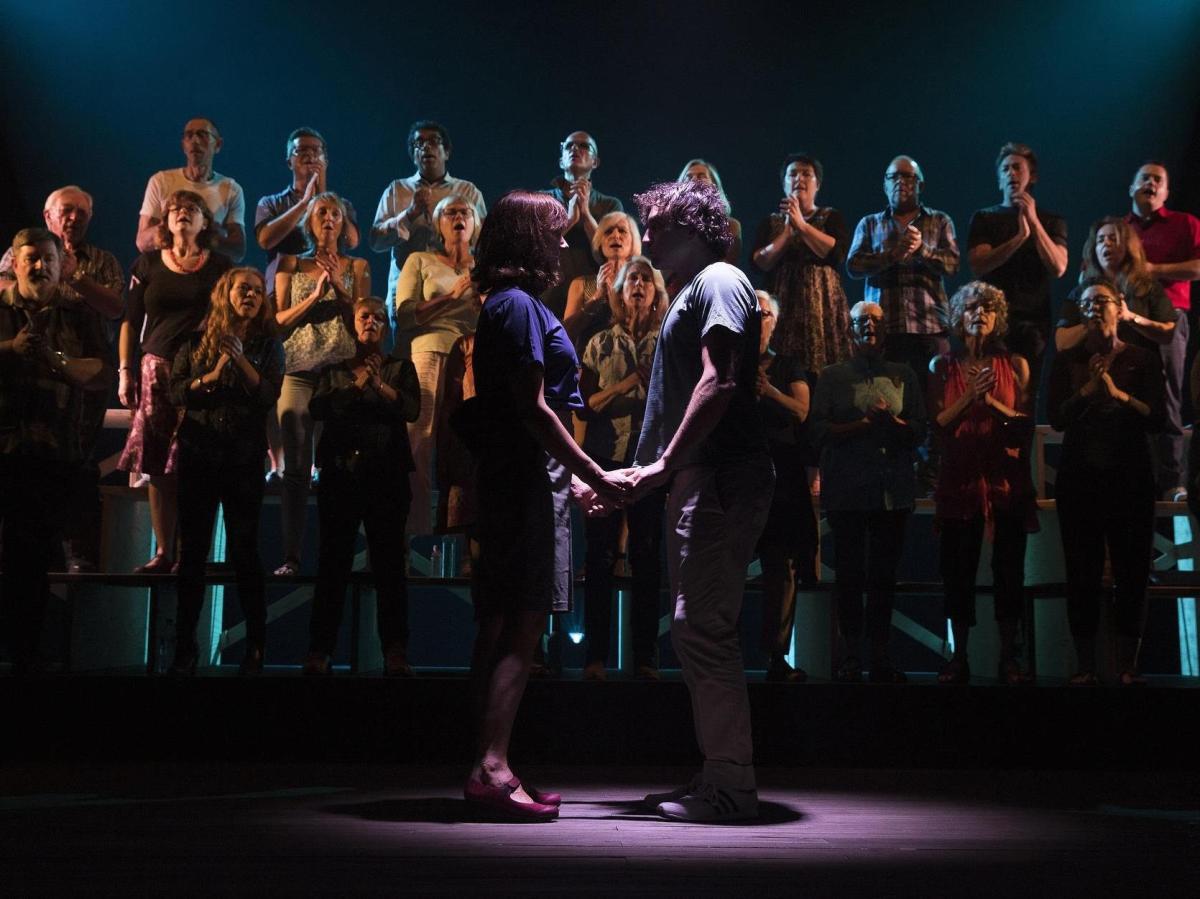Photo: Shane Reid
When tragedy shatters your world, how do you cope? How do you make sense of the heinous and the impossible? How do you go back to living day to day when fragments of terror are lodged in your brain like shrapnel, and everyone you meet – even those you hold most dear – only reminds you of the nightmare you have survived?
Inspired in part by the 2011 massacre perpetrated in Norway by Christian fundamentalist extremist Anders Breivik, in which 77 lost their lives, David Greig’s The Events grapples eloquently with such questions. The result is a compassionate and intelligent exploration of the limitations of empathy and the ways a damaged community heals.
Claire (Catherine McClements) is a progressive Anglican priest who divides her time between her partner and her church, where she leads a choir made up of some of her community’s most vulnerable – embodied on stage by a real community choir; a different group every night, who have rehearsed their songs in advance, but are only given the play’s script moments before they walk out on stage. Consequently the emotions which flash across their faces as the play unfolds mirror those of the audience looking on, enriching the play’s verisimilitude and impact.
One day, a local Boy (Johnny Carr) enters the church and watches the choir sing. Claire invites him to join in. ‘We’re all one big crazy tribe,’ she says.
He responds by drawing a gun and opening fire.
Having survived the (unseen) slaughter in which most of her choir were gunned down, Claire becomes obsessed with trying to understand the Boy’s actions and motivations. Is he evil or was he simply ‘empathy impaired’?
A range of figures – a journalist, a psychologist, a UKIP-style politician, the Boy’s father, his friend, and Claire’s partner Catriona – respond to her questions as best they’re able. Carr plays them all, his performance subtly altered for each character but still familiar enough so that we always recognise the Boy in each of them – as Claire does. Obsessed with trying to understand him, she sees the Boy in everything and in every moment of her waking day.
As Clare, McClements’ descent into monomania and desperation is utterly convincing, even as she contemplates the worst kind of revenge. Wracked by survival guilt, she embodies our horror and confusion; the collective attempt to rationalise when such massacres occur: ‘I don’t want to understand what happened to me,’ she cries at one point. ‘I know what happened to me. I want to know what happened to him.’
Carr is less impressive in his variety of roles. As the Boy he is intense and believable, but there’s a muted quality and a sameness to the other characters he plays (which may be a directorial choice to emphasise the world as seen through Claire’s eyes, though it may also be a lack of versatility) and a subsequent flattening of emotion which drains the play of drama. And when he switches in an eye blink from the Boy to the concerned Catriona in one scene, he fails to release the emotion of the former from his body, rendering the change of character unconvincing.
Just as Claire’s world has been shattered, so too is the play’s chronology: time has splintered, and Greig’s script flashes backwards and forwards as Claire grapples to comprehend the events which have left her a psychically wounded survivor – so broken she feels that her soul has been torn from her still-living body.
It is at such moments that the participating choir’s presence truly comes into play – their combined voices invest the production with emotional intensity and truth, bringing lumps to throats and tears to eyes. Coupled with Geoff Cobham’s sensitive lighting design, which towards the end of the production washes over the audience, making us all part of the one community, the choir unites us. In many ways, as we watch its members react to the play’s events, the choir are us, and their singing of the refrain ‘I don’t understand’ comes as close as any of us ever will to knowing why mass shootings occur.
Rating: 3 stars out of 5
The Events
A State Theatre Company of South Australia, Belvoir and Malthouse Theatre co-production
By David Greig
Directed by Clare Watson
Set & lighting designer: Geoff Cobham
Musical director: Carol Young
With Catherine McClements & Johnny Carr
Her Majesty’s Theatre, Adelaide
25 February – 5 March 2016
Additional performances:
Belvoir, Upstairs Theatre, 12 May – 12 June
Malthouse, Merlyn Theatre, 21 June – 10 July
Adelaide Festival of Arts
26 February – 14 March
www.adelaidefestival.com.au
Richard Watts visited Adelaide as a guest of the Adelaide Festival of Arts, and attended a preview of The Events with the approval of the State Theatre Company of South Australia.





